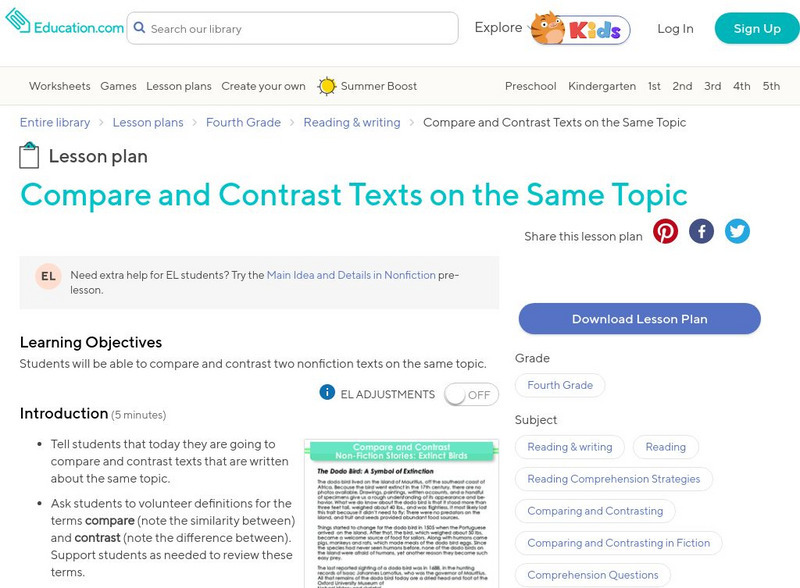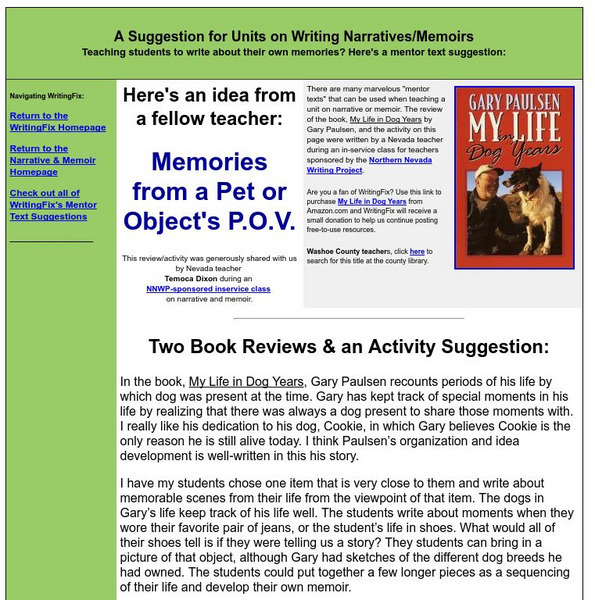Curated OER
Take a Dip: Be a Field Guide
Students create a Visitor's Field Guide for the local area in order to enhance the understanding of natural features of the area for those who may be unfamiliar with the area.
Curated OER
How Can Gel-electrophoresis Help in the Identification of a Dna Sample?
Students investigate the principles of gel electrophoresis and DNA testing. They watch and discuss a PowerPoint presentation, and solve a DNA mystery using the information they learned from the presentation.
Curated OER
Confronting World Stereotypes
Students examine pervasive worldwide stereotypes through role play. They are placed in the role of someone from a different ethnic background. After interacting with groups of students in their new role, stereotyped students write a...
Curated OER
I Get By With a Little Help From My Friends
Eleventh graders "walk a mile" in a person's shoes who had a role in the Underground Railroad and examine the risks and complications of the Underground Railroad.
Curated OER
Analyzing Election Cartoons
Young scholars are introduced to the history of political cartoons and examine both historical and modern examples. They analyze a cartoon that expresses an opinion about a current event different than their own and develop an original...
Curated OER
The Vietnam War
Students acquire information about the Vietnam War Era from the internet, textbook and various sources. They transfer the information that they have acquired into a newspaper format. Students create editorials, cartoons, graphics and...
Curated OER
The Power of Persuasion
Ninth graders examine the use of corporal punishment in Canada. In groups, they make their own advertisement trying to persuade others to support or disagree with the practice. They also write a persuasive essay and draw an image...
Curated OER
French and Indian War
Seventh graders complete a unit on the French and Indian War. They conduct an Internet document search and use what they find to complete a document based essay about the war.
Curated OER
Writing From Experience (Grades 7-12)
Students brainstorm in preparation for writing an expressive essay. They review their responses to 'Writing from Experience' and write notes and brainstorm other ideas or details for their essays. They take turns illustrating their life...
Curated OER
Design-A-Room
Students employ art as a means of communication. The meaning of the communication comes out in the design of a unique room that is 3 dimensional. The use of the imagination is encouraged as well as visualization skills.
Curated OER
Stem Cell Bioethics
Students study the steps of embryonic development. They distinguish between the advantages/disadvantages of embryonic stem cells vs. adult stem cells and discuss the ethical implications of stem cell research.
Curated OER
The Four Lobes of the Brain
Twelfth graders are introduced to the four lobes of the brain and their functions. As a class, they participate in a discussion about an article they read earlier. They answer comprehension questions as a way to review the material.
Curated OER
The Screwtape Letters by C.S. Lewis
In this C.S. Lewis learning exercise, students answer eight short answer comprehension questions and define six words. Students can define twenty extra credit vocabulary words.
Curated OER
Exploring with Cartography
Students are introduced to the topic of cartography. Using the internet, they research the paths and goals of early explorers. They create a PowerPoint presentation of the information they collected. They also develop a...
Curated OER
Technology as Change: The Atlantic Canada Fishery
Ninth graders use the internet to research the history of the Atlantic Canada Fishery and how it was different from today. Using this information, they write a research paper and share it with their classmates. In groups, they...
Curated OER
Reading Multicultural Literature
Students read several fictional pieces which examine issues of urbanization and rural cultures. They discuss how the place a person lives affects the kind of person they become.
Curated OER
African-American Innovators
Students investigate the contributions of African Americans throughout history. They research and identify accomplishments of various African American Scientists/Innovators in recognition of Black History Month.
Curated OER
History of Supreme Court
Students study the role of the U.S. Supreme Court in U.S. history. They explore current events about the U.S. Constitution and discuss the Marbury v. Madison case from 1803. They identify the term "judicial review" and judicial...
PBS
Pbs Learning Media: Math + Arts: Perspective Drawing
In this lesson, students use line segments, angles, and parallel and perpendicular lines in order to create a one point perspective drawing.
Rock and Roll Hall of Fame
Rock & Roll Hall of Fame: Sti Lesson 17: Irony Made Understandable
One of the more difficult literary concepts to teach is irony, especially ironic point of view. Not only do learners often miss the subtle linguistic clues, they become distracted by the issue of author's intent. Whether it's the classic...
Science Education Resource Center at Carleton College
Serc: Science and Religion
A instructional activity using the strategy of structured academic controversy where learners explore the roots of differing perspectives on evolution, In the process, they develop a deepened understanding of science and religion, and...
Education.com
Education.com: Compare and Contrast Texts on the Same Topic
[Free Registration/Login Required] Explain that even if two texts are written about the same topic, they can have different information depending on the author's perspective or the source of the information. When we compare two texts on...
Writing Fix
Writing Fix: Suggestions for Writing Memoirs: Memories of a Pet or Object
This lesson, inspired by Gary Paulsen's My Life in Dog Years, helps students write memoirs or narratives about their lives through the eyes of a pet, a favorite pair of jeans, or their shoes. Students choose one item that is very close...
Alabama Learning Exchange
Alex: Franklin D. Roosevelt's Pearl Harbor Address
The viewing goals for this lesson were for students to use a visual text, Franklin D. Roosevelt's "Day of Infamy" speech (played first without sound), to identify visual cues & understand why he may have chosen to use certain...






















